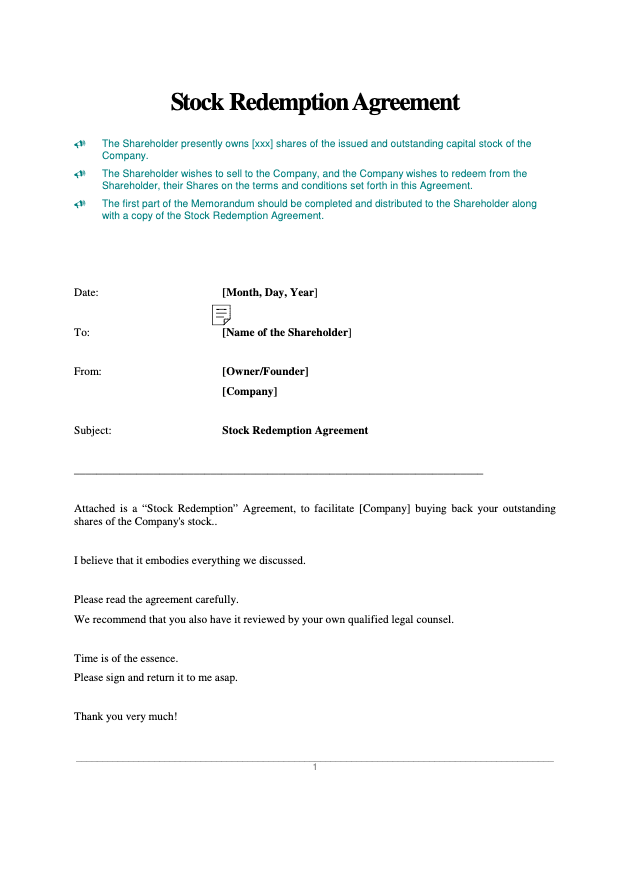Stock redemption is a common process used in companies or organizations in which the firm repossesses its shares and stocks from the stockholders. There are many reasons why a firm should repossess its sold stocks and shares.
The process takes place either in the life or after the death of the stockholder or shareholder. For this purpose, a stock redemption agreement is a good move because once a shareholder of a company dies, the owner is unable to do anything without this agreement.
What is a Stock Redemption Agreement?
A stock redemption agreement can protect an individual who owns or manages a corporation in a situation when a shareholder dies, leaves, or disabled. It is an agreement that spells out the terms for transferring or purchasing ownership shares in advance. The agreement outlines a promise to buy back the shareholders or stockholder's interest.
The stock redemption agreements are used if an individual manages a corporation with shareholders or is a partner or shareholder in a corporation. Such agreements keep the business smooth and give benefits to the shareholder, their loved ones, and the corporation.
First, a buy and sell agreement is made to limit the owners from transferring shares' ownership in a tightly knit business. This helps to create a planned and orderly transfer of business interest. One of the major decisions while drafting the agreement is either the transaction should be transferred or redemption.
This agreement shows the complete details of how the shares will be purchased or transferred. It guides the members to make fair decisions to keep the business running smoothly.
The Typical Format of a Stock Redemption Agreement Included
The typical format of the stock redemption agreement form at CocoDoc depends on the company. Here are a few common terms that the contractor should keep in mind while drafting the contract.
- Payment: The organization agrees to pay the decided amount to the leaving shareholder. This part includes the mode of payment and the last due date.
- Delivery: The corporation must pay the successful amount via the chosen payment mode. The shareholders agree to fully transfer the rights and ownership over those listed shares.
- Shareholder Warranties: In this part, the shareholder provides the warranty that he is the sole owner and there will be no involvement of any third party.
- Expenses: Any expenses raised while drafting the redemption agreement shall be assigned to each party.
- Modification: The party can modify/amend the agreement after providing a signed addendum by both parties.
- Acceptance: There should be signatures by both parties, which states that they have understood all the terms and agree to follow the same.
Tips for Writing a Stock Redemption Agreement
The strategies for drafting a strong stock redemption agreement sample are always important. There are several meetings with the potential corporations to hash out all the details that will be included in the agreement. Below mentioned are some tips for writing a stock redemption agreement.
- Add the Legal Names: The redemption agreement is a business contract; thus, try to add all the legal names of the stakeholders, addresses, and phone numbers. Declaring the name of a person who will be managing a shareholder is a good practice.
- Specify the Responsibilities: Identify all the rules regarding the officers and stakeholders in order to avoid disputes between the team and determine the proper steps to handle the issue.
- Amend the Original Agreement: Figuring out what the stakeholder agreement should depict is a crucial task. In case of any amendments, it is necessary that both parties fully agree on it.
- Discuss the Legal Obligations: A successful agreement always discusses the legal obligations that each party must follow. Make clear legal obligations for every person who signs the agreement.
- Outline the Financial Responsibilities: It is easy to overlook the financial responsibilities of the agreement when the business is just starting. Do mention the amount of money each shareholder must invest in the business.
Common Mistakes to Avoid When Drafting a Stock Redemption Agreement
If any individual has shares in any private corporation, then he should be no stranger to a stockholder’s agreement. This part states the common mistakes that should be avoided while composing a shareholder’s agreement.
- No Reference to Capital Dividend Account (CDA): When drafting the agreement, it is significant to include clauses regarding the expense of capital dividends. The capital dividend account is the focal point of agreement as the dividend account assists in passing tax-free to shareholders as dividends. If it is not mentioned in the agreement, then there is no guarantee that a person will be paid or given your expected tax benefits.
- Lack of Tax Planning: It is important to know the importance of tax planning and the significance of tax and its applications. Tax rules keep on changing, and it could be expensive to alter the changes in agreement every time. The agreement should exhibit the tax strategies that will be used in it.
- Optional Buyouts: Purchases and sales of shares on a shareholder’s death are compulsory. It seems appealing and survival to the shareholder company to mention its optional buyout. Lacking clear statements might cause a problem for the corporate company in the future. If no buyouts are mentioned in the agreement, the future of business would be put at risk when the ownership of the deceased’s shares is officially discussed.
Conclusion
Thinking and preparing yourself for the worst scenarios will help to run the businesses smoothly. A stock redemption agreement can protect by spelling out the terms for purchasing and transferring the ownership shares in advance. The agreement plans benefits for the corporation, stakeholder, and their loved ones. Besides, you might be interested in more agreement templates at CocoDoc.
